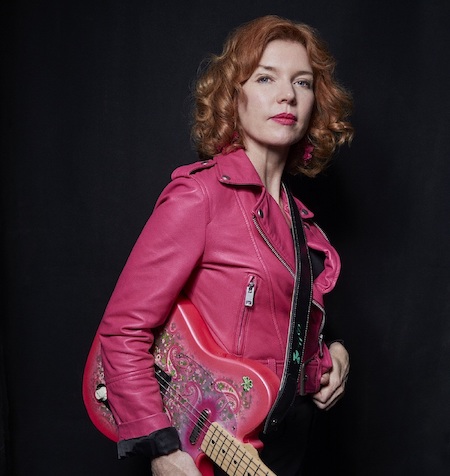
Photo: Sue Foley by Danny Clinch
By Nick Cristiano
Multi award-winning, Canada-born and Austin-based Sue Foley, guitarist, singer, songwriter, just released her new album, Pinky’s Blues out on Stony Plain Records, a follow up to her critically acclaimed The Ice Queen (2018) which featured Billy Gibbons, and Jimmie Vaughan.
When she started making her new album, Pinky’s Blues, Sue Foley wasn’t sure how it would turn out.
“We didn’t really have a clear-cut plan,” the blues firebrand said from her home in Austin, Texas, referring to herself and producer Mike Flanigin. “We just went in with the intention of doing good songs and having a great time.”
Cut entirely live in the studio in a whirlwind three days, Pinky’s Blues meets Foley’s modest ambitions for the set and then some. She’s backed mostly by just bassist Jon Penner and drummer Chris “Whipper” Layton (Flanigin plays Hammond B3 on two cuts and Jimmie Vaughan adds rhythm guitar on one). That puts the focus squarely on the vocals and guitar-playing that have made Foley one of the most dynamic and transfixing blues performers over the last three decades. (She’s also an author and academic. More on that below.)
Reflecting her long interest in the history of the blues, Pinky’s Blues ended up as mostly a salute to Texas strains of the music, featuring numbers by artists such as Lavelle White, Clarence “Gatemouth” Brown, Frankie Lee Sims, and Angela Strehli. A fine writer herself, Foley contributed just three originals this time: the instrumental “Pinky’s Blues” (“Pinky” is the nickname of her pink paisley Telecaster), “Hurricane Girl,” and “Dallas Man,” which fits the set’s broad theme as it’s a nod to all the great blues guitarists who have hailed from that area.
“I’m always writing, always stockpiling stuff. It’s just something I do on a regular basis,” Foley says. “In this case, because it was just a three-day session and live, we just picked what we liked the best.”
Foley had never recorded a whole album live like that before, but she wouldn’t mind doing it again. Besides giving the performances a thrilling immediacy, “it actually makes the process of going out and playing this stuff live simple.”
Pinky’s Blues continues the journey that began when Foley arrived in Austin from her native Canada at age 21 in 1990 with the imprimatur of the late Clifford Antone, owner of the famed Austin blues club and record label that bore his name. By 1992 she had proved herself there among some of the world’s best blues players and released her debut, Young Girl Blues, on Antone’s Records.
“I was just so excited to get there, to meet those players, see them up close, and experience everything I’d heard about Austin,” she recalls. “I was just so jazzed about it and excited by it. It wasn’t an intimidation thing at all.”
During her career Foley has indeed experienced some “show-me-what-you-got” attitude, “but Austin was really welcoming, and these were the top players in the world.”

Photo: Sue Foley by Danny Clinch
“I always had a theory: the better the player, the more comfortable they are with themselves, the less competitive they are. — ‘You be you, and I’ll be me.’”
Of particular help early were guitarist Derek O’Brien and drummer George Rains, who co-produced her first two albums. “Those two really helped me feel at home in the scene, and that I belonged there and could own my ground.”
(These days she seems to have a special rapport with Jimmie Vaughan, who has become a friend and mentor as well as a frequent playing partner. “He’s so important to me. I learn stuff every time.”)
That’s why she now feels obligated to help others, which Foley does through instructional videos.
“I ended up with a few really nice students out of it and I really enjoy that process of giving back,” she says. “I think it’s really important to pass that forward.”
In 2001, Foley began work on a book called Guitar Woman, which features interviews with more than 100 female guitarists of various styles, from Bonnie Raitt to Joan Armatrading and Carol Kaye of the Wrecking Crew.
“It’s getting closer,” she says of the stop-and-start project, excerpts of which have appeared in her former column in Guitar Player magazine and other outlets.
“It was just kind of getting the narrative down, like, ‘What are you trying to say with this?’ That was the biggest thing. … In order to tie it together, I had to put my own narrative in there … to give some unique quality to it.
“It’s an inspiring project, and I’m hoping it goes out on the heels of this one,” she adds, meaning her new album.
The book is also tied in with the Ph.D. in musicology the former assistant professor of music at North Carolina’s Catawba College is pursuing through York University in Toronto.
Along the way, Foley also had time to take up flamenco guitar, which she incorporates into some of her performances.
“I am not a flamenco guitar player,” she says. “But I’ve learned some of the techniques, and some of the forms I’ve been able to apply into the blues playing, because flamenco and blues are very simpatico. Both are improvised art forms, both are very passionate, and they’re music of the people.”
After three decades, Foley remains dedicated to the blues music she first discovered through the Rolling Stones, Led Zeppelin, and ZZ Top. So what’s the difference between the artist who made Young Girl Blues and the one who just did Pinky’s Blues?
“I still like the same music, I’ve just refined my style more,” she says. “I’ve obviously lived more, I’ve got more story to tell, that’s the biggest difference. … My story is bigger.”
Foley, who went home to Canada in the late ‘90s after the birth of her son and returned to Austin a few years ago, said she still sometimes questions her place in the blues world. But she knows she has paid her dues.
“I’m a Canadian female guitar player – white, obviously. I always feel like I’m a little bit of an outcast. …
“I wasn’t born here, but I did come here to learn it, and I really did study it hard, and I’ve learned real specific things about it. … And I’ve learned from really good, qualified people, the best. …
“I feel like I have a good place in it, and I just want to keep it going.”
Watch “Hurricane Girl”
For more information on Sue Foley see her website here.

Leave A Comment